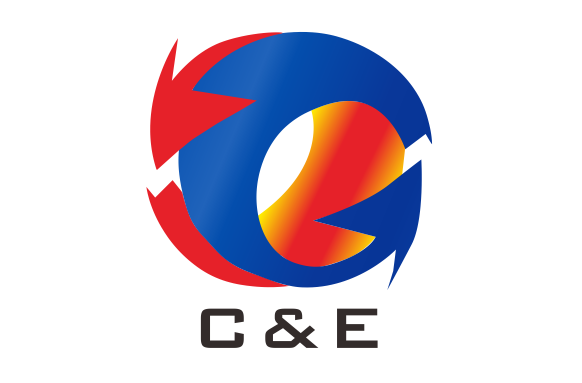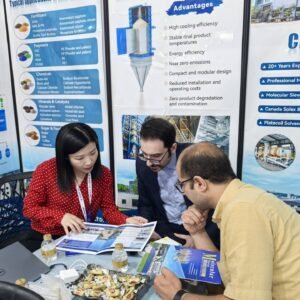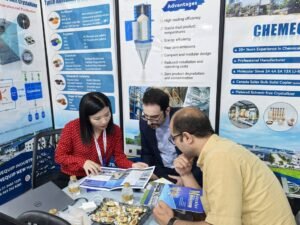What is molecular sieve?
Molecular sieve is a material with tiny, uniform pores of a precise and consistent size. These pores allow the sieve to selectively adsorb molecules of a specific size while excluding larger ones, making molecular sieves highly effective for separating and purifying gases and liquids.
Molecular sieves are typically made from materials like zeolites, which are crystalline aluminosilicates. The most common types of molecular sieves are categorized by their pore sizes, measured in angstroms (Å), such as 3A, 4A, 5A, and 13X. Each type is used for different applications depending on the size of the molecules that need to be separated.
For example:
- 3A: Ideal for drying gases and liquids, as it adsorbs water but excludes larger molecules like ethylene.
- 4A: Used for drying and removing impurities from gases and liquids, such as separating water from ethanol.
- 5A: Suitable for separating normal paraffins from branched-chain and cyclic hydrocarbons.
- 13X: Often used in air separation processes and for removing CO2 and other impurities from natural gas.
Molecular sieves are widely used in industries like petrochemical, chemical, oil and gas, pharmaceuticals, and environmental management for tasks like drying, purifying, and separating various compounds.
The shape of molecualr sieve?
Molecular sieves typically come in a few standard shapes, which are designed to maximize their surface area and ensure efficient adsorption processes. The most common shapes of molecular sieves are:
Beads (Spherical Pellets):
Shape: Small, round pellets.
Size: They can range from about 1mm to 5mm in diameter.
Usage: Beads are commonly used in packed columns for gas or liquid adsorption due to their low pressure drop and high mechanical strength.
Pellets (Cylindrical Extrudates):
Shape: Cylindrical, with a length typically greater than the diameter.
Size: Usually around 1/16 to 1/8 inches in diameter.
Usage: Pellets are used in various industrial applications, particularly where a robust material is needed to withstand high pressures or where the adsorbent bed needs to be of uniform shape.
Powder:
Shape: Finely ground particles.
Usage: Powdered molecular sieves are used in specialized applications, such as coatings or when integrating the sieve into composite materials for highly selective adsorption.
Rods or Tablets:
Shape: Short cylindrical rods, sometimes with flat or slightly rounded ends.
Size: Larger than beads and pellets, typically used for specific industrial applications where a uniform shape is crucial.
Usage: These are less common but may be used in specialized reactors or adsorption units.
These shapes are chosen based on the specific requirements of the application, such as the need for efficient packing, pressure drop considerations, and the mechanical strength of the sieve.
The color of molecular sieve?
The color of molecular sieves can vary depending on their type and the material from which they are made, but they are generally found in the following colors:
3A Molecular Sieve:
Color: Light beige to tan.
Appearance: This sieve typically has a uniform color, often with a matte finish.
4A Molecular Sieve:
Color: Light beige to off-white.
Appearance: Similar to the 3A, the 4A sieve usually appears uniform in color, with a slightly lighter shade.
5A Molecular Sieve:
Color: Light beige to tan.
Appearance: The 5A sieve is often similar in color to the 3A, though sometimes it might have a slightly darker hue.
13X Molecular Sieve:
Color: Light cream to off-white.
Appearance: The 13X sieve tends to be a bit lighter in color compared to the 3A and 5A sieves, often appearing more cream-colored.
The colors mentioned are general and may vary slightly depending on the manufacturer and the exact composition of the sieve. The color can sometimes be an indicator of purity and quality, but it primarily reflects the materials used in the manufacturing process.
The famous brand of molecular sieve?
Several well-known brands are recognized globally for their high-quality molecular sieves, particularly in industrial and commercial applications. Some of these brands include:
UOP (Honeywell UOP):
Overview: UOP, a division of Honeywell, is one of the most recognized names in the molecular sieve industry. They are pioneers in the development and manufacturing of molecular sieves, offering a wide range of products for various industrial applications, including gas processing and refining.
Zeochem:
Overview: Zeochem, a Swiss-based company, is known for producing high-quality molecular sieves, adsorbents, and specialty chemicals. They offer a broad range of molecular sieves for use in gas drying, purification, and separation processes.
Grace (W.R. Grace & Co.):
Overview: Grace is another well-established company in the molecular sieve market. They produce a variety of molecular sieves under their Davison brand, which are widely used in refining, petrochemical, and gas processing industries.
CECA (Arkema Group):
Overview: CECA, a subsidiary of Arkema, is known for its innovative molecular sieve products. They offer sieves for air drying, natural gas dehydration, and other industrial applications. Their products are recognized for high performance and durability.
Tosoh Corporation:
Overview: Tosoh, a Japanese chemical company, produces molecular sieves under their Zeolum brand. These sieves are used in a variety of applications, including air separation, gas drying, and catalysis.
Axens:
Overview: Axens, a subsidiary of the IFP Energies Nouvelles, offers a range of molecular sieves for use in the refining, petrochemical, and natural gas industries. Their products are known for high efficiency and reliability.
Zeolyst International:
Overview: Zeolyst, a joint venture between Shell Catalysts & Technologies and PQ Corporation, is a leading supplier of specialty zeolites, including molecular sieves, used in a variety of industrial processes.
Clariant:
Overview: Clariant is a global specialty chemicals company that produces molecular sieves under their Adsorbents & Additives business unit. Their products are used in a wide range of industries, including automotive, petrochemical, and natural gas processing.
These brands are known for their innovation, quality, and reliability in producing molecular sieves for diverse industrial applications, and they are trusted by companies worldwide for their expertise in adsorption technology.
How to choose a reliable supplier of molecular sieve?
Choosing a reliable supplier of molecular sieves is critical to ensuring the quality and consistency of your processes. Here are several key factors to consider when selecting a supplier:
1. Quality Assurance and Certification
Product Testing: Ensure the supplier conducts rigorous testing for adsorption capacity, bulk density, and particle size distribution. Ask for detailed product specifications and test reports.
2. Reputation and Experience
Industry Experience: Choose a supplier with a proven track record in the molecular sieve industry. Long-standing companies are often more reliable due to their experience and established processes.
Brand Reputation: Opt for suppliers with well-known brands that are recognized for their quality and innovation.
3. Technical Support and Expertise
Expertise: Ensure the supplier has a strong technical team that can provide support and advice on selecting the right molecular sieve for your specific application.
Customized Solutions: A good supplier should be able to offer tailored solutions based on your unique needs, including custom formulations or specific packaging requirements.
After-Sales Support: Reliable suppliers offer comprehensive after-sales services, including technical support, troubleshooting, and regular follow-ups.
4. Consistency and Supply Chain Reliability
Production Capacity: Assess the supplier’s production capacity to ensure they can meet your demand consistently without delays.
Supply Chain Stability: Investigate the supplier’s raw material sources and supply chain reliability. Suppliers with multiple sourcing options or strong relationships with raw material providers are less likely to face disruptions.
Lead Times: Ensure the supplier can meet your required lead times and has a reliable logistics network for timely deliveries.
5. Pricing and Payment Terms
Competitive Pricing: While pricing is important, it should not be the sole deciding factor. Balance cost with the quality and reliability of the product.
Transparent Pricing: Look for suppliers who offer clear and transparent pricing, without hidden fees or unexpected charges.
Payment Terms: Consider the payment terms offered by the supplier. Favorable terms can help manage cash flow and build a strong business relationship.
6. Trial Orders and Samples
Trial Orders: Before committing to large orders, request a trial order or sample batch to test the product quality and performance in your specific application.
Evaluation: Use this trial phase to assess the consistency, quality, and reliability of the product and the supplier’s customer service.
By carefully considering these factors, you can select a supplier that not only meets your immediate needs but also supports your long-term business objectives through reliable supply and consistent product quality.



